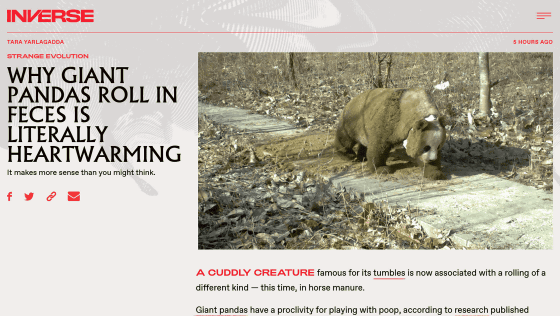Why do pandas apply 'horse poop' to their bodies?

Why wild giant pandas frequently roll in horse manure | PNAS
https://www.pnas.org/content/early/2020/12/01/2004640117
Why giant pandas “frequently roll” in feces — study
https://www.inverse.com/science/panda-poop-study

According to the research team, wild giant pandas living in the Qinling Mountains, which run from east to west in central China, smell horse droppings, rub their cheeks, roll on their droppings, and want to smear them all over their bodies. You can see the action. The research team named this behavior 'horse fecal rolling behavior' and decided to study what the reason was.
It seems that cases where mammals use the feces of other animals are occasionally observed other than giant pandas, and they recognize the smell of feces excreted by predators and avoid dangerous places, or dare to use predator's feces on their bodies. Some animals apply it to mimic the odor and prevent it from being found by predators. However, since horses are not predators for giant pandas, there is no direct benefit to applying horse feces to their bodies.
The picture below shows a giant panda smeared with horse droppings taken by the research team. You can see that the whole body is covered with feces and the black and white pattern is not clear. The feces that the giant panda smears on its body are not excreted by wild horses, but by horses that pass through the Qinling Mountains trade route that connects Chang'an and Shu Han . Researchers have pointed out that this trade route has been used for thousands of years, and wild giant pandas may have become accustomed to horse droppings and found some use.

by Fuwen Wei
First, the research team tracked the giant panda's 'horse fecal rolling behavior' by combining infrared cameras, direct observations, and climate data. Then, it turned out that the giant panda spreads horse feces on the body in many cold seasons from November to April, and the giant panda does not roll on the feces when the temperature is 20 degrees or higher. It has emerged that it may be a cold-related behavior for giant pandas to smear horse feces.
Further observation revealed that most of the horse droppings that giant pandas apply to their bodies are 'relatively new droppings within 10 days of the horse's excretion' and that they are not interested in old droppings. It was. Substances found in fresh horse faeces but not in old feces includeβ-caryophyllene (BCP) andβ-caryophyllene-oxide (BCPO) , a type of sesquiterpene .
The research team thought that BCP and BCPO were related to the fecal rolling behavior of giant panda horses, and conducted experiments on giant pandas at the zoo. The research team prepared three hay bundles made to imitate a pile of feces and sprinkled them with 'BCP and BCPO', 'fatty acids' and 'water', respectively, so that the giant panda could freely touch the hay bundles. did. Then, the giant panda was attracted to the bundle of hay sprinkled with 'BCP and BCPO', and the bundle sprinkled with 'fatty acid' and 'water' was almost ignored.

In a mouse experiment, the research team also applied BCP to the soles of some mice and saline to control mice. When observing how long mice in this state spend on cold scaffolds kept at 10 degrees Celsius and normal temperature scaffolding kept at 28 degrees Celsius, BCP-coated mice are 10 degrees longer. Turned out to spend on the scaffolding. Also, in general, when mice feel cold, multiple groups try to retain heat, but it seems that this behavior was not observed in mice coated with BCP, and BCP is involved in thermoregulation and becomes cold. It was speculated that it increased resistance.
When the research team conducted a genome analysis of giant pandas, they found that an ion channel called TRPM8, which functions as a temperature sensor that detects 'coldness' in peripheral sensory nerves, interacts with BCP or BCPO. BCP and BCPO have the potential to effectively suppress TRPM8 and reduce the coldness felt by animals.
At the time of writing, it was not confirmed that animals other than giant pandas showed fecal rolling behavior in horses, but the research team said, 'This study is a potential scientific resource for habitats for wild animals to adapt to survival. We are actively looking for and shedding light on how to use it. '

Related Posts:







